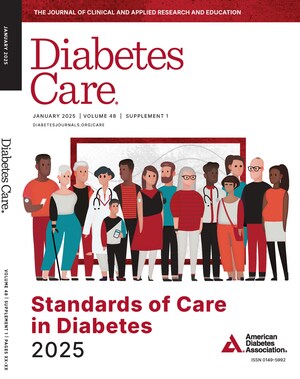New guidelines include updates to recommendations around obesity, hypertension, heart failure medication, social determinants of health, and lipid management
ARLINGTON, Va., Dec. 12, 2022 /PRNewswire/ -- Today, the American Diabetes Association® (ADA) published Standards of Care in Diabetes—2023 (Standards of Care), comprehensive, evidence-based guidelines for the prevention, diagnosis, and treatment of diabetes. Based on the latest scientific research and clinical trials, the Standards of Care includes vital new and updated practice guidelines to care for people with diabetes and prediabetes, including for the diagnosis and treatment of youth and adults with type 1, type 2, or gestational diabetes; strategies for the prevention or delay of type 2 diabetes and associated comorbidities; and therapeutic approaches that can reduce complications, mitigate cardiovascular and renal risk, and improve health outcomes.
"ADA's mission is to prevent and cure diabetes, a chronic illness that requires continuous medical care, and the release of ADA's Standards of Care is a critical part of that mission," said Chuck Henderson, chief executive officer for the ADA. "This year's annual report provides necessary guidance that considers the role health inequities play in the development of diabetes, particularly for vulnerable communities and communities of color disproportionately impacted by the disease. This guidance will ensure health care teams, clinicians and researchers treat the whole person."
Notable updates to the Standards of Care in Diabetes─2023 include:
- Emphasis on supporting higher weight loss (up to 15%) based on the efficacy of and access to newer medications when appropriate
- New recommendations related to sleep health and physical activity in people with diabetes
- Broad consideration of social determinants of health in guiding the design and delivery of care
- New hypertension diagnosis cut-offs (hypertension is now defined as a systolic blood pressure ≥130 mmHg or a diastolic blood pressure ≥80 mmHg)
- The expanded role of SGLT2 inhibitor use in preserved and reduced heart failure ejection fraction
- The role of finerenone in individuals with diabetes and chronic kidney disease with albuminuria
- New lipid management recommendations suggesting lower LDL goals for high-risk individuals
"Evidence-based recommendations drive better care for all people with diabetes, including vulnerable communities and those at high risk. ADA's Standards of Care are the gold standard for diabetes care and prevention that allows clinicians around the world to remain abreast of the rapidly changing healthcare landscape," said Dr. Robert Gabbay, chief scientific and medical officer for the ADA.
Other noteworthy changes to the 2023 Standards of Care include:
- Details on digital health, telehealth, and telemedicine and the benefits of these modalities of care delivery
- The utility of point-of-care A1C testing for diabetes screening and diagnosis
- An expanded "Nonalcoholic Fatty Liver Disease" (NAFLD) subsection
- Screening for food insecurity by any member of the diabetes healthcare team
- Updates in alignment with the Management of Hyperglycemia in Type 2 Diabetes, 2022. A Consensus Report by the American Diabetes Association (ADA) and the European Association for the Study of Diabetes (EASD)
- The use of technology in older adults with diabetes
- The use of person-first and inclusive language
- Updates in vaccination for people with diabetes
- Updates in COVID-19 and diabetes
The Standards of Care are reviewed and updated annually by the ADA's Professional Practice Committee (PPC). "The field of diabetes is changing fast. ADA's Standards of Care strives to provide up-to-date guidance using the best available evidence rigorously and comprehensively," said Nuha ElSayed, MD, MMSc, PPC chair. The committee is a multidisciplinary team of 20 leading U.S. experts in the field of diabetes care and includes physicians, nurse practitioners, certified diabetes care and education specialists, registered dietitians, pharmacists, methodologists, and others with experience in adult and pediatric endocrinology, epidemiology, public health, cardiovascular risk management, microvascular complications, preconception and pregnancy care, weight management, diabetes prevention, behavioral and mental health, inpatient care, and use of technology in diabetes management.
Two designated representatives of the American College of Cardiology (ACC) participated in the subcommittee on the "Cardiovascular Disease and Risk Management" section. This section received endorsement from the ACC for the sixth consecutive year. New this year, the ADA garnered the expertise of specialized subject matter experts by adding them as committee members to the subsections on neuropathy, retinopathy, foot care, and non-alcoholic fatty liver disease.
Today, the Standards of Care in Diabetes—2023 is available online and is published as a supplement to the January 2023 issue of Diabetes Care®. The online version will be annotated in real-time with necessary updates if new evidence or regulatory changes merit immediate incorporation through the "living" Standards of Care process. The ADA fosters broad dissemination through a shortened version of the guidelines, known as the Abridged Standards of Care, for primary care providers in its journal Clinical Diabetes® and offers a convenient Standards of Care app as well as a Standards of Care pocket chart. Other Standards of Care resources, including a webcast with continuing education credit and a full slide deck, can be found on the ADA's professional website, DiabetesPro®.
About the American Diabetes Association
The American Diabetes Association (ADA) is the nation's leading voluntary health organization fighting to bend the curve on the diabetes epidemic and help people living with diabetes thrive. For 82 years, the ADA has driven discovery and research to treat, manage, and prevent diabetes while working relentlessly for a cure. Through advocacy, program development, and education we aim to improve the quality of life for the over 133 million Americans living with diabetes or prediabetes. Diabetes has brought us together, what we do next will make us Connected for Life®. To learn more or to get involved, visit us at diabetes.org or call 1-800-DIABETES (1-800-342-2383). Join the fight with us on Facebook (American Diabetes Association), Spanish Facebook (Asociación Americana de la Diabetes), LinkedIn (American Diabetes Association), Twitter (@AmDiabetesAssn), and Instagram (@AmDiabetesAssn).
Contact: Rebecca Fisher, (703) 253-4918
[email protected]
SOURCE American Diabetes Association

WANT YOUR COMPANY'S NEWS FEATURED ON PRNEWSWIRE.COM?
Newsrooms &
Influencers
Digital Media
Outlets
Journalists
Opted In






Share this article